Kotlin
Das moderne Java
28.01.2019
Niklas Lochschmidt
Software Entwickler bei
@Niklas_L


Mehr dazu auf bryter.io
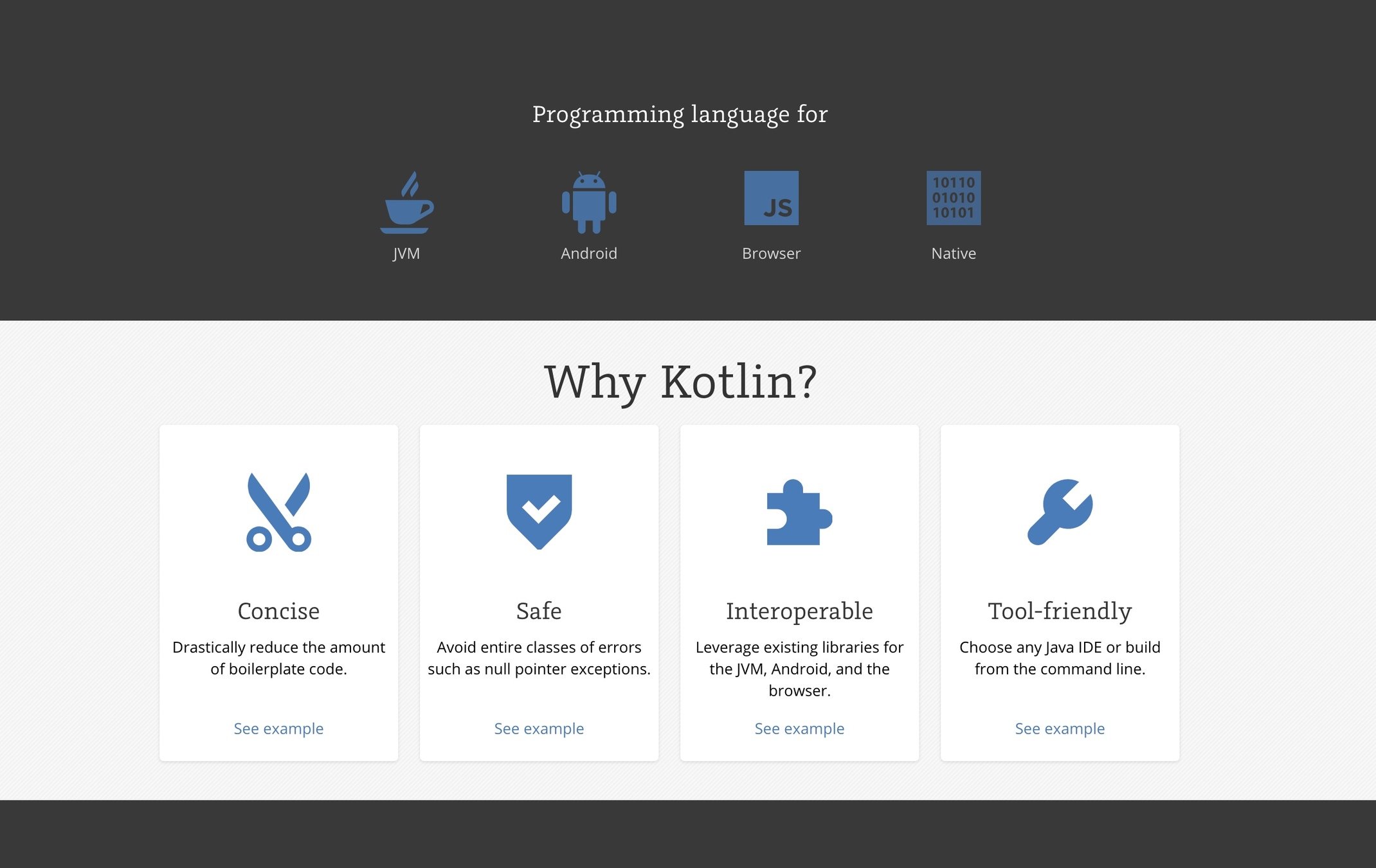
Agenda
Photo by Sarita Rungsakorn
präzise und kompakt
Concise
Typinferenz, vals, keine Semikolons
val hello = "Hello World"
println(hello)final String hello = "Hello World"
System.out.println(hello);Kotlin
Java
final var hello = "Hello World";
System.out.println(hello);Java 10
Klassen und Methoden
class UserProfile(
val firstName: String,
val lastName: String) {
fun fullName() = "$firstName $lastName"
}public final class UserProfile {
private final String firstName;
private final String lastName;
public UserProfile(
String firstName,
String lastName) {
this.firstName = firstName;
this.lastName = lastName;
}
public String getFirstName() {
return firstName;
}
public String getLastName() {
return lastName;
}
public String fullName() {
return firstName + " " + lastName;
}
}
Kotlin
Java
new UserProfile("John", "Doe")UserProfile("John", "Doe")Mächtige API für Collections
listOf(1, 2, 3, 4, 5)
.map { it + 1 }
.filter { it % 2 == 0 }
.take(2)List.of(1, 2, 3, 4, 5)
.stream()
.map(it -> it + 1)
.filter(it -> it % 2 == 0)
.limit(2)
.collect(toList());Kotlin
Java

Mächtige API für Collections
listOf(1, 2, 3, 4, 5)
.asSequence()
.map { it + 1 }
.filter { it % 2 == 0 }
.take(2)
.toList()List.of(1, 2, 3, 4, 5)
.stream()
.map(it -> it + 1)
.filter(it -> it % 2 == 0)
.limit(2)
.collect(toList());Kotlin
Java

Extension Functions
fun Int.seconds() = Duration.ofSeconds(this.toLong())
fun String.toUUID() = UUID.fromString(this)Kotlin
val timeout = 60.seconds()
val userId = "dc9b21f2-986d-438f-80a6-e6afe430e6e8".toUUID()Kotlin
val text = java.io.File("trykotlin.txt").readText()
val price = "39.90".toBigDecimalOrNull()Kotlin
Eigene Extension Functions definieren
Kotlin Stdlib
Konkretes Beispiel:
- Kundennummer
- Name
- Von anderem Kunden geworben (optional)
- Kunden können sich nicht selbst werben
- Beginn der Kundenbeziehung
- Datum der letzten Bestellung (optional)
- Gesamtvolumen der Bestellungen
- 0 € zu Beginn
- Kann niemals weniger als 0 € werden
| Customer |
|---|
| customerNr: Int name: String referredBy: Int [0..1] becameCustomerAt: Instant = now() lastOrderAt: Instant [0..1] totalOrderValue: Double = 0.0 |
| setTotalOrderValue(Double) |
Kunde im Kontext eines Kundenbindungsprogrammes
Customer customer = new Customer(1, "Peter", 2, Instant.now(), null 0.0);Fragen:
- Welcher Parameter ist
referredBy? - Welche Parameter sind notwendig, welche optional?
- Wenn ein Parameter hinzugefügt wird müssen wir hier nochmal ran
Java
Kurzer Exkurs
Notwendigkeit von Buildern in Java
public final class Customer {
private final int customerNr;
private String name;
private final Integer referredBy; // Builder default: null
private final Instant becameCustomerAt; // Builder default: Instant.now()
private Instant lastOrderAt; // Builder default: null
private double totalOrderValue; // Builder default: 0.0
private Customer(Builder builder) {
if (builder.customerNr == builder.referredBy) {
throw new IllegalArgumentException("Customers can not refer themselves");
}
customerNr = builder.customerNr;
name = builder.name;
referredBy = builder.referredBy;
becameCustomerAt = builder.becameCustomerAt;
lastOrderAt = builder.lastOrderAt;
setTotalOrderValue(builder.totalOrderValue);
}
public void setName(String value) {
this.name = Objects.requireNonNull(value);
}
public void setLastOrderAt(Instant value) {
this.lastOrderAt = value;
}
public void setTotalOrderValue(double value) {
if (value < 0.0) {
throw new IllegalStateException("Can not set totalOrderValue to less than 0.0");
}
this.totalOrderValue = value;
}Java
Wichtig: Setter benutzen sonst findet keine Prüfung statt
...
public int getCustomerNr() {
return customerNr;
}
public String getName() {
return name;
}
public int getReferredBy() {
return referredBy;
}
public Instant getBecameCustomerAt() {
return becameCustomerAt;
}
public Instant getLastOrderAt() {
return lastOrderAt;
}
public double getTotalOrderValue() {
return totalOrderValue;
}
@Override public String toString() {
return String.format("Customer(customerNr = %d, name = %s ...)", customerNr, name);
}
@Override public boolean equals(Object other) {
if (other instanceof Customer) {
return ((Customer) other).customerNr == customerNr;
}
return false;
}
@Override public int hashCode() {
return Integer.hashCode(customerNr);
}
...Java
...
public static class Builder {
// Required
private final int customerNr;
private final String name;
// Optional
private Integer referredBy = null;
private Instant becameCustomerAt = Instant.now();
private Instant lastOrderAt = null;
private double totalOrderValue = 0.0;
public Builder(int customerNr, String name) {
this.customerNr = Objects.requireNonNull(customerNr);
this.name = Objects.requireNonNull(name);
}
public Builder referredBy(int value) {
this.referredBy = value;
return this;
}
public Builder becameCustomerAt(Instant value) {
this.becameCustomerAt = value;
return this;
}
public Builder lastOrderAt(Instant value) {
this.lastOrderAt = value;
return this;
}
public Builder totalOrderValue(double value) {
this.totalOrderValue = value;
return this;
}
public Customer build() { return new Customer(this); }
}
}Java
Customer customer = new Customer(2, "Peter", 1, Instant.now(), null 0.0)Customer customer = new Customer.Builder(2, "Peter")
.referredBy(1)
.build()
Vorher
Nachher
Ungelöste Probleme
- Parameter
customerNrundnamewerden nicht benannt -
Builderundbuild()ist Rauschen
Java
Java
public final class Customer {
private final int customerNr;
private String name;
private final Integer referredBy; // Builder default: null
private final Instant becameCustomerAt; // Builder default: Instant.now()
private Instant lastOrderAt; // Builder default: null
private double totalOrderValue; // Builder default: 0.0
private Customer(Builder builder) {
if (builder.customerNr == builder.referredBy) {
throw new IllegalArgumentException("Customers can not refer themselves");
}
customerNr = builder.customerNr;
name = builder.name;
referredBy = builder.referredBy;
becameCustomerAt = builder.becameCustomerAt;
lastOrderAt = builder.lastOrderAt;
setTotalOrderValue(builder.totalOrderValue);
}
public void setName(String value) {
this.name = Objects.requireNonNull(value);
}
public void setLastOrderAt(Instant value) {
this.lastOrderAt = value;
}
public void setTotalOrderValue(double value) {
if (value < 0.0) {
throw new IllegalStateException("Can not set totalOrderValue to less than 0.0");
}
this.totalOrderValue = value;
}
public int getCustomerNr() {
return customerNr;
}
public String getName() {
return name;
}
public int getReferredBy() {
return referredBy;
}
public Instant getBecameCustomerAt() {
return becameCustomerAt;
}
public Instant getLastOrderAt() {
return lastOrderAt;
}
public double getTotalOrderValue() {
return totalOrderValue;
}
@Override public String toString() {
return String.format("Customer(customerNr = %d, name = %s ...)", customerNr, name);
}
@Override public boolean equals(Object other) {
if (other instanceof Customer) {
return ((Customer) other).customerNr == customerNr;
}
return false;
}
@Override public int hashCode() {
return Integer.hashCode(customerNr);
}
public static class Builder {
// Required
private final int customerNr;
private final String name;
// Optional
private Integer referredBy = null;
private Instant becameCustomerAt = Instant.now();
private Instant lastOrderAt = null;
private double totalOrderValue = 0.0;
public Builder(int customerNr, String name) {
this.customerNr = Objects.requireNonNull(customerNr);
this.name = Objects.requireNonNull(name);
}
public Builder referredBy(int value) {
this.referredBy = value;
return this;
}
public Builder becameCustomerAt(Instant value) {
this.becameCustomerAt = value;
return this;
}
public Builder lastOrderAt(Instant value) {
this.lastOrderAt = value;
return this;
}
public Builder totalOrderValue(double value) {
this.totalOrderValue = value;
return this;
}
public Customer build() { return new Customer(this); }
}
}Standardwerte
Eigenwerbung abfangen
Bestellwert niemals negativ
Java
...den Wald vor lauter Bäumen nicht sehen
Softwareentwickler verbringen sehr viel Zeit mit der Suche nach den Stellen die wir verändern oder erweitern wollen
Eine Zeile Code weniger die wir schreiben,
ist eine Zeile Code weniger in der ein Fehler auftreten kann

public final class Customer {
private final int customerNr;
private String name;
private final Integer referredBy; // Builder default: null
private final Instant becameCustomerAt; // Builder default: Instant.now()
private Instant lastOrderAt; // Builder default: null
private double totalOrderValue; // Builder default: 0.0
private Customer(Builder builder) {
if (builder.customerNr == builder.referredBy) {
throw new IllegalArgumentException("Customers can not refer themselves");
}
customerNr = builder.customerNr;
name = builder.name;
referredBy = builder.referredBy;
becameCustomerAt = builder.becameCustomerAt;
lastOrderAt = builder.lastOrderAt;
setTotalOrderValue(builder.totalOrderValue);
}
public void setName(String value) {
this.name = Objects.requireNonNull(value);
}
public void setLastOrderAt(Instant value) {
this.lastOrderAt = value;
}
public void setTotalOrderValue(double value) {
if (value < 0.0) {
throw new IllegalStateException("Can not set totalOrderValue to less than 0.0");
}
this.totalOrderValue = value;
}
public int getCustomerNr() {
return customerNr;
}
public String getName() {
return name;
}
public int getReferredBy() {
return referredBy;
}
public Instant getBecameCustomerAt() {
return becameCustomerAt;
}
public Instant getLastOrderAt() {
return lastOrderAt;
}
public double getTotalOrderValue() {
return totalOrderValue;
}
@Override public String toString() {
return String.format("Customer(customerNr = %d, name = %s ...)", customerNr, name);
}
@Override public boolean equals(Object other) {
if (other instanceof Customer) {
return ((Customer) other).customerNr == customerNr;
}
return false;
}
@Override public int hashCode() {
return Integer.hashCode(customerNr);
}
public static class Builder {
// Required
private final int customerNr;
private final String name;
// Optional
private Integer referredBy = null;
private Instant becameCustomerAt = Instant.now();
private Instant lastOrderAt = null;
private double totalOrderValue = 0.0;
public Builder(int customerNr, String name) {
this.customerNr = Objects.requireNonNull(customerNr);
this.name = Objects.requireNonNull(name);
}
public Builder referredBy(int value) {
this.referredBy = value;
return this;
}
public Builder becameCustomerAt(Instant value) {
this.becameCustomerAt = value;
return this;
}
public Builder lastOrderAt(Instant value) {
this.lastOrderAt = value;
return this;
}
public Builder totalOrderValue(double value) {
this.totalOrderValue = value;
return this;
}
public Customer build() { return new Customer(this); }
}
}class Customer(
val customerNr: Int,
var name: String,
val referredBy: Int? = null,
val becameCustomerAt: Instant = Instant.now(),
var lastOrderAt: Instant? = null,
totalOrderValue: Double = 0.0) {
var totalOrderValue: Double = 0.0
set(value) {
require(value >= 0.0) {
"Can not set totalOrderValue to less than 0.0"
}
field = value
}
init {
require(referredBy != customerNr) {
"Customers can not refer themselves"
}
this.totalOrderValue = totalOrderValue
}
override fun toString() =
"Customer(customerNr = $customerNr, name = $name)"
override fun equals(other: Any?) = when (other) {
is Customer -> other.customerNr == customerNr
else -> false
}
override fun hashCode() = customerNr.hashCode()
}Java
Kotlin
Setter-Aufruf
val customer = Customer(1, "Peter", referredBy = 2)val customer = Customer(
customerNr = 1,
name = "Peter",
becameCustomerAt = Instant.parse("2019-01-28T11:00:00Z")
)besser:
- Parametername explizit angegeben
- erlaubt hinzufügen von neuen Parametern an beliebiger Stelle
- erlaubt umsortieren von Parametern ohne Aufruf zu ändern
Kotlin
Kotlin
Developer Happiness
Safe
Fehlerklassen vermeiden
"I couldn't resist the temptation to put in a null reference [into ALGOL W], simply because it was so easy to implement."
"I call it my billion-dollar mistake"
- Tony Hoare at QCon 2009
Nullable Types
NullPointerExceptions verhindern?
- JSR 305 (dormant) "Annotations for Software Defect Detection" (@Nonnull)
- Findbugs
- Lombok @NonNull
- JetBrains Annotations (@Nullable und @NotNull)
In Java ist alles "Nullable by default"
Nullable Types in Kotlin
Null muss explizit behandelt werden
val hello: String = null
// Error: Null can not be a value of a non-null type Stringfun sayHello(name: String) {
println("Hello $name")
}val hello: String? = null
// ✓sayHello(null)
// Error: Null can not be a value of a non-null type StringKotlin
Kotlin
Kotlin
Kotlin
fun getReferrer(customer: Customer): Customer? {
return findCustomerByNr(customer.referredBy)
}
// Error: Type mismatch. Required Int, Found Int?fun findCustomerByNr(customerNr: Int): Customer? { ... }Kotlin
Kotlin
Nullable Types in Kotlin
if (customer.referredBy == null) {
return null
}
findCustomerByNr(customer.referredBy) // KompiliertDer Compiler merkt sich null-Checks
customer.referredBy ?: return null
findCustomerByNr(customer.referredBy)Der "Elvis" Operator
Kotlin
Kotlin
Nullable Types in Kotlin
fun findCustomerByNr(customerNr: Int): Customer? { ... }Kotlin
Minimize mutablilty
- Don't provide methods that modify the object's state
- Ensure that classes can't be extended
- Vererbung nur an speziell definierten und dokumentierten Punkten
- Make all fields final
- Make all fields private, access through getters
-
Ensure exclusive access to any mutable components
-
keine Referenz auf interne Daten rausgeben wenn diese veränderbar sind
-
Item 17 aus "Effective Java"
Data classes
data class OrderReceived(
val orderNr: Int,
val customerNr: Int,
val totalValue: Double,
val receivedAt: Instant = Instant.now(),
)- Alle Felder mit
valsind nicht veränderbar - Von einer
data classkann nicht geerbt werden - Die generierte Methode
copy(...)liefert ein neues Objekt zurück - Zusätzlich generierte Methoden
- Getter für jedes Feld
toString()-
equals()undhashCode()
Kotlin
Pattern matching und Smart casts
sealed class InvitationResponse {
object Available : InvitationResponse()
data class ConflictWithOtherEvent(val otherEventName: String) : InvitationResponse()
}
fun autoReply(response: InvitationResponse): String {
return when (response) {
is Available -> "Great, see you there"
is ConflictWithOtherEvent -> "Have fun at ${response.otherEventName}"
}
}else wird nicht benötigt, da alle Subklassen bekannt sind
sealed: Subklassen können nur in dieser Datei deklariert werden
Zugriff auf otherEventName ohne expliziten Cast
Kotlin
Pattern matching und Smart casts
sealed class InvitationResponse {
object Available : InvitationResponse()
object ConflictWithPrivateEvent : InvitationResponse()
data class ConflictWithOtherEvent(val otherEventName: String) : InvitationResponse()
}
fun autoReply(response: InvitationResponse): String {
return when (response) {
is Available -> "Great, see you there"
is ConflictWithOtherEvent -> "Have fun at ${response.otherEventName}"
}
}Error: when expression must be exhaustive, add necessary ConflictWithPrivateEvent branch or else branch instead
Neue Subklasse ConflictWithPrivateEvent
Kotlin
Standardmäßig sicher(er)
Interoperable
Von Kotlin zu Java und zurück
Java in Kotlin nutzen
Funktioniert im wesentlichen problemlos
Beispiel wie Kotlin mit Unsicherheit aus Java Code umgeht:
public interface ReplyGenerator {
public String createReply();
}fun printer(replyGenerator: ReplyGenerator) {
val reply = replyGenerator.createReply()
...
}IntelliJ markiert reply als String! da unklar ist ob es String oder String? ist
Kotlin
Java
Bekannte Tools und Frameworks weiternutzen
Frameworks und Tools mit Kotlin Support
Entwickler von Bibliotheken bieten Erweiterungen für Kotlin an




Jackson


Kotlin Code aus Java aufrufen
class Customer @JvmOverloads constructor(
val customerNr: Int
var name: String = "Neuer Kunde"
)Customer customer = new Customer(1000);
customer.getName(); // "Neuer Kunde"
customer.setName("Meyer");fun withConnection(
dbName: String,
execute: (Connection) -> Unit): {
...
}fun String.toInstant() = Instant.parse(this)DBKt.withConnection("customerDb", connection -> {
...
});StringOpsKt.toInstant("2019-01-28T11:00:00Z");Kotlin Klassen in Java verwenden
Top-level funktion in DB.kt
Extension function in StringOps.kt
Kotlin
Java
Kotlin
Java
Java
Kotlin
Kotlin ist keine Magie
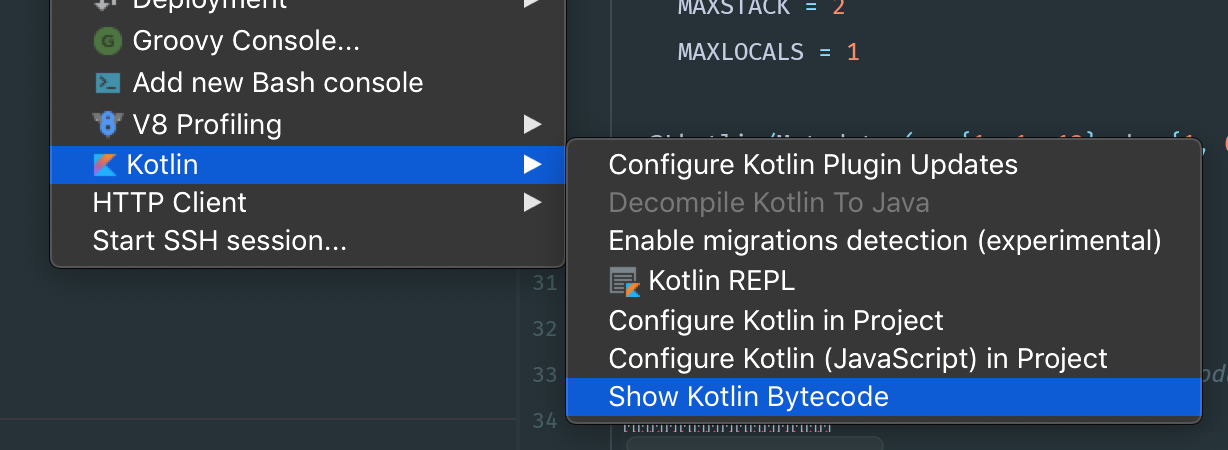

Evolution in Kotlin
1.3
1.4
1.5
1.0
1.1
1.2
1.3
1.0
1.1
1.2
Version
Binär-kompatibel mit
Compiler
Auf den Schultern von Riesen
Getting started
Photo by David Bartus
Kotlin Playground
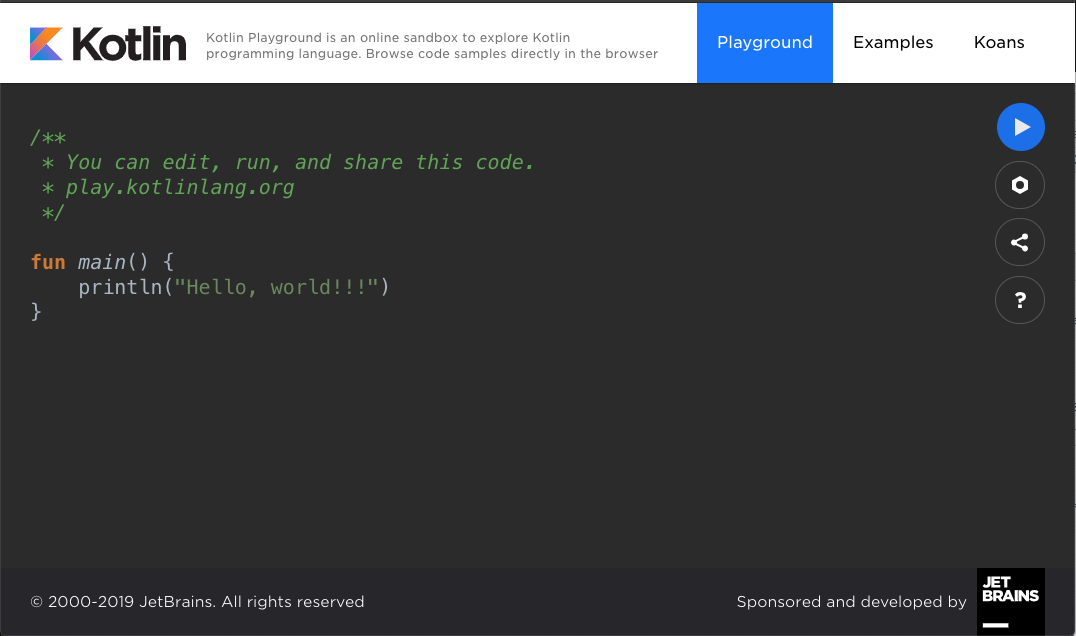
Kotlin Koans
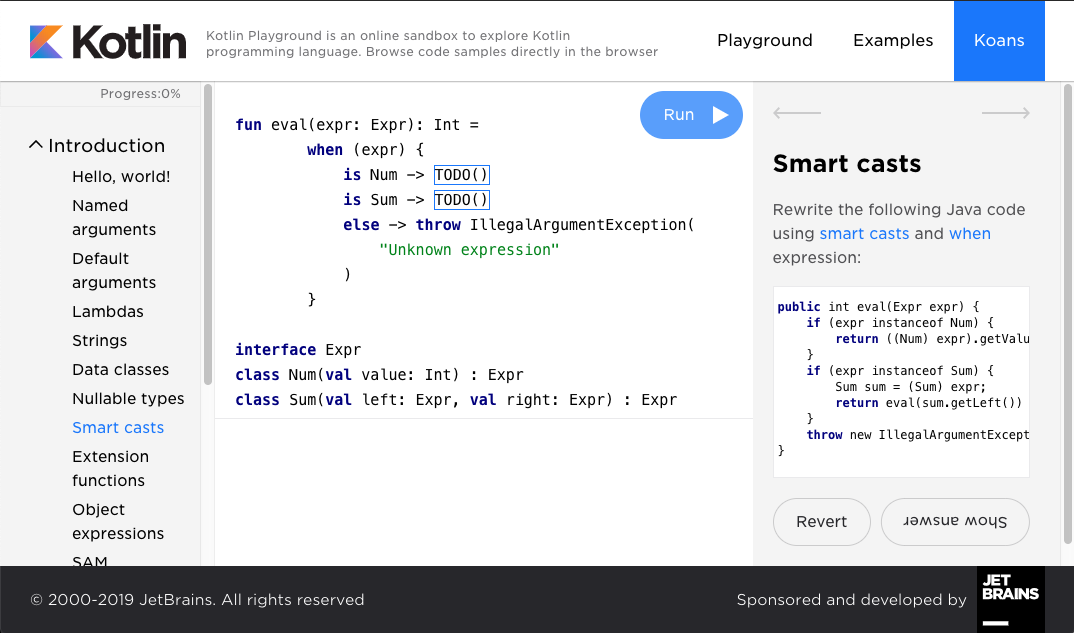

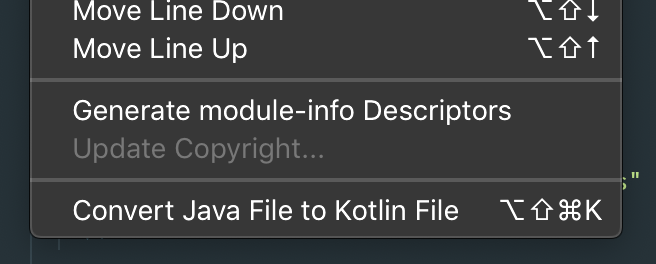
Automatische Konvertierung in IntelliJ
Weitere Informationsquellen
- https://kotl.in/learn offizielle Seite
- https://kotlinexpertise.com von Simon Wirtz @s1m0nw1
- https://blog.philipphauer.de von Philipp Hauer @philipp_hauer
-
https://www.meetup.com/de-DE/Kotlin-Rhein-Main/
- Nächstes Kotlin Meetup am 27.03.2019 im Office Frankfurt 👋
Vielen Dank für Ihre Aufmerksamkeit